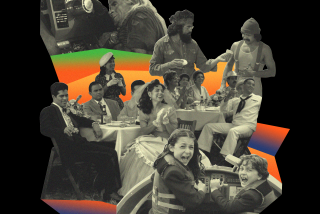Juan Jose Campanella clues you in to ‘The Secret in Their Eyes’
- Share via
When Argentine filmmaker Juan José Campanella was handed the Oscar for foreign-language film last month, there was something oddly appropriate that the presenters were Pedro Almodóvar and Quentin Tarantino. Campanella’s film, “The Secret in Their Eyes,” which opens Friday in New York and Los Angeles, exists at the intersection of the character-driven art film and the plot-driven genre film.
The story of “Secret” finds a retired cop (Ricardo Darín) attempting to piece together a brutal rape and murder that he never solved while also taking small romantic steps with a woman he has long loved and never won.
With its story line of mystery and romance and its flashbacks to the case’s initial investigation, the film also functions as an allegory of how Argentina continues to grapple with its own past, haunted by the specter of repressive dictatorship.
“The balance we were trying to strike, a lot of it is intuition,” Campanella said recently in Los Angeles. “But it’s the balance between the crime story and the love story, not the political reason. The political is a backdrop, a context. I always compared it to World War II in ‘Casablanca.’ It’s happening, and it emerges in personal ways, in attitudes. But you would not describe ‘Casablanca’ as a war movie.”
The film is adapted from a novel by Eduardo Sacheri. Campanella first read the book strictly for his own pleasure without thinking of adapting it into a movie. Eventually, his passion for the story would lead him to collaborate with Sacheri on a screenplay.
“There were images that kept coming back to me,” said Campanella, “especially the old man who feels alone, who wants to find where he went wrong. To me, that’s the motivation of the whole story. It’s not about a guy obsessed with the case for professional reasons, or to find $10 million buried somewhere, it’s a completely internal reason. And that to me was a different kind of mystery.”
Campanella, 50, studied at New York University film school, and one of his previous films, 2001’s “Son of the Bride,” was also nominated for the foreign-language Oscar. Campanella has since directed episodes of American television shows such as “Law & Order: Special Victims Unit,” “House” and “30 Rock.”
Perhaps from his time in television, there is a startling efficiency and economy to Campanella’s storytelling, and he and Sacheri were careful to seed the surprising twist ending in “Secret” throughout the script.
“The good ending is unpredictable yet unavoidable,” said Campanella. “You have to know enough that you don’t see it coming, but when it does happen you say, ‘Of course.’ Everybody likes to play detective.”
Calling up ‘Harry’
“Handsome Harry,” opening Friday in limited release, including Los Angeles, finds another lone man delving into his past to decipher his future.
Filmmaker Bette Gordon is best known for “Variety,” her early-’80s look at a woman working in the ticket booth of a dirty movie theater on New York City’s then-sleazy 42nd Street. Gordon emerged from the same New York City arts scene as Kathryn Bigelow, and “Variety” is now considered a landmark for both female filmmaking and the then-emergent American independent film movement.
With “Handsome Harry,” Gordon examines the world of male friendship with the same distanced, inquisitive eye she previously brought to the female experience. After Harry Sweeney (Jamey Sheridan) receives a surprising deathbed phone call from an old Navy buddy (Steve Buscemi), he is sent on an odyssey to piece together what really happened one drunken, violent night many years ago.
“Harry was not that different,” Gordon said during a recent phone call of her switch to examining the male perspective. “I see the movie more as a reflection on similar themes.
“You can’t examine gender only from one point of view. The real examination of gender and sexuality has two sides, actually probably more than two.”
The cast and crew of “Variety” included such future downtown notables such as Nan Goldin, John Lurie, Tom DiCillo, Spalding Gray and Christine Vachon, and with “Handsome Harry” Gordon again pulls together a rather remarkable team of collaborators. In addition to Sheridan and Buscemi, the cast includes Aidan Quinn, John Savage, Titus Welliver and Campbell Scott as the rest of Harry’s old Navy buddies.
Gordon is also a longtime professor at Columbia University’s graduate film division, where Nicholas Proferes, screenwriter of “Handsome Harry,” is a colleague.
“It was a perfect combination of this beautiful story he’d written and my female lens on a world he inhabited, a very male world,” said Gordon.
“Even though I had made movies about renegade female characters,” added Gordon, “and as different as this is, it isn’t that different. The male journey is not dissimilar. I’ve always been trying to understand the male language, which sometimes is very secret and private.”
More to Read
Only good movies
Get the Indie Focus newsletter, Mark Olsen's weekly guide to the world of cinema.
You may occasionally receive promotional content from the Los Angeles Times.











